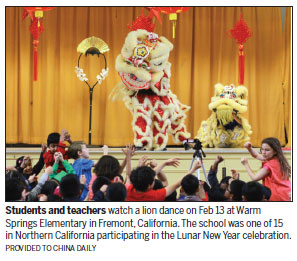

Living in the Bay Area as an Asian American is like on an ongoing soul-searching journey - periodically there are cultural immersion programs, exchanges and diversity awareness events that you encounter and at which you are expected to play the role of cultural ambassador - most importantly to reach out as a bridge to non-Asian communities.
On Monday, I attended the Warm Springs Elementary School Lunar New Year show, one episode in a serial celebration among 15 US public and private schools in Northern California that started on Jan 26.
Luo Ping, who orchestrated the celebration and is the founder of the nonprofit organization Able2Shine, said it took her about three months to start the program from scratch. The tasks included enrolling performers, training children as hosts and allocating community resources to best present the essence of Chinese New Year in the US.
"I'm hopeful that we, the new generation of Asian Americans, no matter the off-the-boat immigrants or American-born Asians, can strive to build a bridge to facilitate understanding among people of various cultural backgrounds and ethnicities," Luo said.
With a task force of five, Luo masterminded a program that highlights traditional New Year's activities such as lion dance, Chinese strings and percussion, and costumed dance and supplemented it with some pop culture, PPAP for example, the "Pen Pineapple Apple Pen" lyrics introduced by Japanese comedian Kosaka Daimou, which became an Internet sensation early in 2016.
At Mission Valley Elementary, where Luo's 9-year-old son Arron is a third grader, principle Denise Mapelli dressed herself in a crimson traditional Chinese costume and joined a group of students and parents of Asian origin for a five-minute fashion show on Jan 26.
Calling the program "thrilling and very entertaining", Denise said she was excited to see Asian-American children, confident and taking pride in their heritage.
Peng Mao, mother of two young boys, took the lead in coordinating the show at her elder son's home school, Curtner Elementary in Milpitas.
"If I could have known that the preparation was so taxing, I would probably be a quiet follower," Peng said, recalling her two-month toil and many sleepless nights in order to present the show at Curtner on Feb 8.
"No volunteers (at our school) have had experience in hosting a large-scale performance like ours this year," said Peng. "Each and every step is an adventure."
Jackie Vo-Felbinger, principal of Curtner Elementary, responded warmly to Peng and her husband Zhang Yuanlei when the couple approached her to check if the school would allow a show "with and for our students".
"I was thrilled to welcome this important opportunity for the Curtner community," she said.
When asked if she believed if the organizers fulfilled their goal of promoting Lunar New Year culture in a diverse community, Vo-Felbinger said "most definitely".
"We received comments from students of all backgrounds who talked about how much they enjoyed the show and how they want to experience this celebration again," she said. Peng and her organizing committee decided to include face changing (bianlian) in the program. Bianlian refers to an ancient dramatic art that is part of the more general Sichuan opera.
Performers wear brightly colored costumes and masks, move to fast-paced, dramatic music and change from one face to another almost instantaneously with the swipe of a fan, a movement of the head or a wave of the hand.
"The face-changing magic of Master Zhang was unlike anything I've seen in person," Vo-Felbinger said.
Contact the writer at junechang@chinadailyusa.com